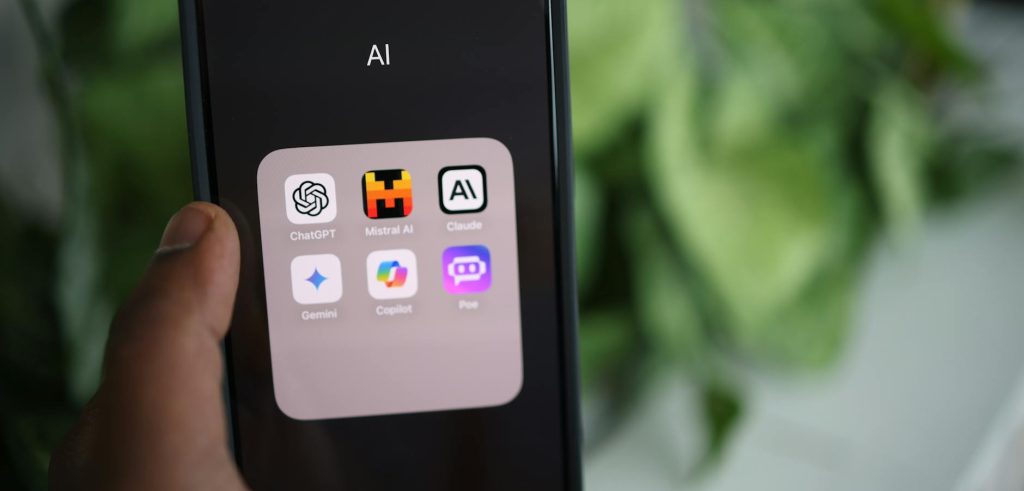5 AI Tools Every Nigerian Professional Should Master
Professionals who don’t understand how to use AI tools judiciously risk being left behind in workflows, productivity, and expectations.

Photo by Solen Feyissa
Nigeria is emerging as a frontrunner in generative AI adoption. A global survey by Ipsos and Google found that 70% of Nigeria’s online population has used generative AI—well above the global average of 48%—and that 81% expect AI to drive economic transformation in the country.
Companies are following suit. A Zoho-commissioned study in 2025 revealed that 93% of Nigerian organisations have begun integrating AI, with 31% achieving advanced deployments spanning multiple departments. Significantly, 94% now have privacy officers. This shows a forward-thinking posture toward responsible adoption.
This rapid uptake matters for professionals. With so many firms embracing AI across sectors—from finance to telecoms to retail—proficiency with AI tools is no longer optional. It has become a differentiator. Professionals who don’t understand how to use AI tools judiciously risk being left behind in workflows, productivity, and expectations.
Below are five AI tools that Nigerian professionals should know deeply—not superficially. They combine immediate relevance, low barriers to entry, and high potential for elevating productivity.
Often dismissed as a novelty, ChatGPT has matured into a powerful workplace assistant. Businesses are already using ChatGPT-based chatbots for customer service on WhatsApp and Instagram, automating responses to common inquiries, order confirmations, and even product recommendations—all without expanding staff shifts.
Internally, professionals use it to draft emails, generate report outlines, summarise research, or brainstorm—freeing cognitive space for insight rather than drafting.
To use ChatGPT well, treat it as a first draft generator: always edit its output, localise its phrasing, check facts, and guard sensitive data input. Because privacy concerns are real, professionals must engage AI ethically, mindful of confidentiality and bias.
Clear communication remains a currency in business environment. Whether communicating across teams, with clients, or drafting proposals, polished writing distinguishes professionalism. Grammarly has expanded beyond grammar to include tone suggestions, document summarisation, and integrations with email and collaboration tools.
For professionals, this tool can mitigate the friction when English is not a first language, when writing under pressure, or when documentation standards are inconsistent. Use it to draft first, then refine with cultural and local nuance.
Data is currency, especially in sectors like banking, retail, and healthcare. Microsoft Power BI, with its natural-language query and predictive analytics features, allows professionals to ask simple questions—“How did this branch perform last month?”—and get visual, actionable answers without deep coding. Given Nigeria’s fast-moving markets, the ability to slice and visualise data rapidly supports decision-making, financial forecasting, and risk management.
Meetings—even online—are pivotal in workplaces. But many professionals miss key details when trying to capture notes. Otter.ai automates transcription and summarization, freeing participants to engage rather than frantically scribble. It’s especially useful in hybrid meetings, remote team briefings, or policy discussions. Professionals using Otter save time post-meeting, ensure accountability, and reduce misunderstandings.
Visuals matter—presentations, reports, social media content, or training materials benefit enormously when they are clean, branded, and visually engaging. Canva’s AI tools—such as background removal, smart layout suggestions, and Magic Write for captions and figure text—enable professionals without formal design training to produce polished visuals. Strong design helps content get noticed. Professionals can leverage Canva designs to reinforce messages; pair visuals with clear explanations to avoid style over substance.
Understanding what tools to use is only half the equation. The true professional stands out by how deeply and responsibly they use them. AI tools amplify work, but they also amplify mistakes.
First, local context matters:
Connectivity challenges are real—when every app counts and switching tools due to latency is common, choosing tools that work offline or handle intermittent connectivity is vital. Use features like Canva’s offline mode, or Otter’s mobile recording, where possible.
Second, ethical use cannot be afterthought:
Use of ChatGPT or AI tools with client or personal data demands carefulness. Organisations are increasingly investing in privacy officers and strong AI policy frameworks, recognising that responsible AI use builds trust and competitive edge.
Third, skill gaps persist:
Reports suggest only about 3% of Nigerian IT professionals specialise in AI or robotics, and upskilling remains a priority for many firms. Professionals should pursue training—via online courses, local bootcamps, or national initiatives like NITDA programmes—to ensure fluency not just in usage, but in underlying logic, prompt design, bias awareness, and tool limitations.
Finally, integration, not novelty, drives value:
Professionals don’t need dozens of AI tools. They need to embed a few wisely chosen ones into daily workflows—use ChatGPT to draft, Grammarly to polish, Power BI to analyse, Otter to capture, Canva to present. Over time, this builds consistency, reliability, reputation.



